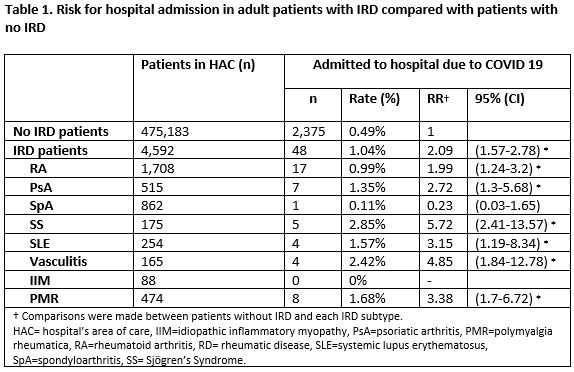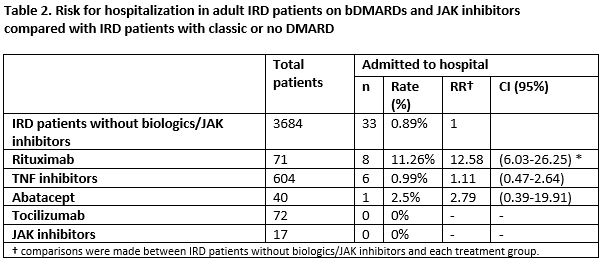Session Information
Date: Friday, November 6, 2020
Title: Epidemiology & Public Health Poster I: COVID-19 & Rheumatic Disease
Session Type: Poster Session A
Session Time: 9:00AM-11:00AM
Background/Purpose: Patients with inflammatory rheumatic diseases (IRD) have an increased risk for infection related to immunosuppression secondary to their disease, treatment and comorbidities. Nonetheless recent studies don’t support a higher risk for SARS-CoV-2 infection (COVID19) or a more severe disease in the patients. Analysis of individual risk factors among IRD related to their disease group and treatment is necessary.
The aim of this study is to assess the risk for hospital admission due to COVID 19 in adult patients with different IRDs and targeted immunosuppressive treatments.
Methods: Patients with confirmed COVID19 that were hospitalized in Ramón y Cajal University Hospital between February the 1st and May the 22nd 2020 were included. Confirmed infection was established by positive nasopharyngeal swab for SARS-CoV-2 or characteristic bilateral infiltrates on chest radiograph/computerized tomography. We identified among hospitalised patients those diagnosed with IRD followed in the Rheumatology department. Demographic and clinical data were collected, and risk for hospital admission was compared between patients with and without IRD. Individual risks according to specific IRD and treatments were analysed.
Results: A total of 2423 patients (0.5% of the population in hospital’s area of care) were hospitalized due to COVID19 during the study period and 48 of them had a previous diagnosis of IRD (1.04% of all IRD patients). Median age was 62 years (range 19 to 88), and 62.8% were female. Risk for hospital admission was significantly higher in patients with IRD older than 65 years, with arterial hypertension, diabetes and/or interstitial lung disease related to IRD (data not shown).
Rates and relative risk ratios for infection and hospital admission regarding IRD and immunosuppressive treatments are represented in tables 1 and 2. There was no difference in hospital admission rates among patients on bDMARDs with or without methotrexate.
Conclusion:
- Patients with IRD had a higher risk for hospital admission due to severe COVID 19. Sjögren syndrome and systemic vasculitis had the highest risk for hospitalization among IRD patients.
- We found a higher risk for hospitalization in patients treated with rituximab, but not in patients with anti-TNF drugs or other biologic treatment.
To cite this abstract in AMA style:
López-Gutierrez F, García-Fernández A, Loarce-Martos J, Calvo-Sanz L, Del Bosque-Granero I, Garcia V, Blanco-Cáceres B, Pijoan-Moratalla C, Villalobos-Sánchez L, Bachiller-Corral J, Vázquez M. Does the Type of Rheumatic Disease or Biologic Treatment Increase the Risk of Developing Severe COVID-19? [abstract]. Arthritis Rheumatol. 2020; 72 (suppl 10). https://acrabstracts.org/abstract/does-the-type-of-rheumatic-disease-or-biologic-treatment-increase-the-risk-of-developing-severe-covid-19/. Accessed .« Back to ACR Convergence 2020
ACR Meeting Abstracts - https://acrabstracts.org/abstract/does-the-type-of-rheumatic-disease-or-biologic-treatment-increase-the-risk-of-developing-severe-covid-19/


